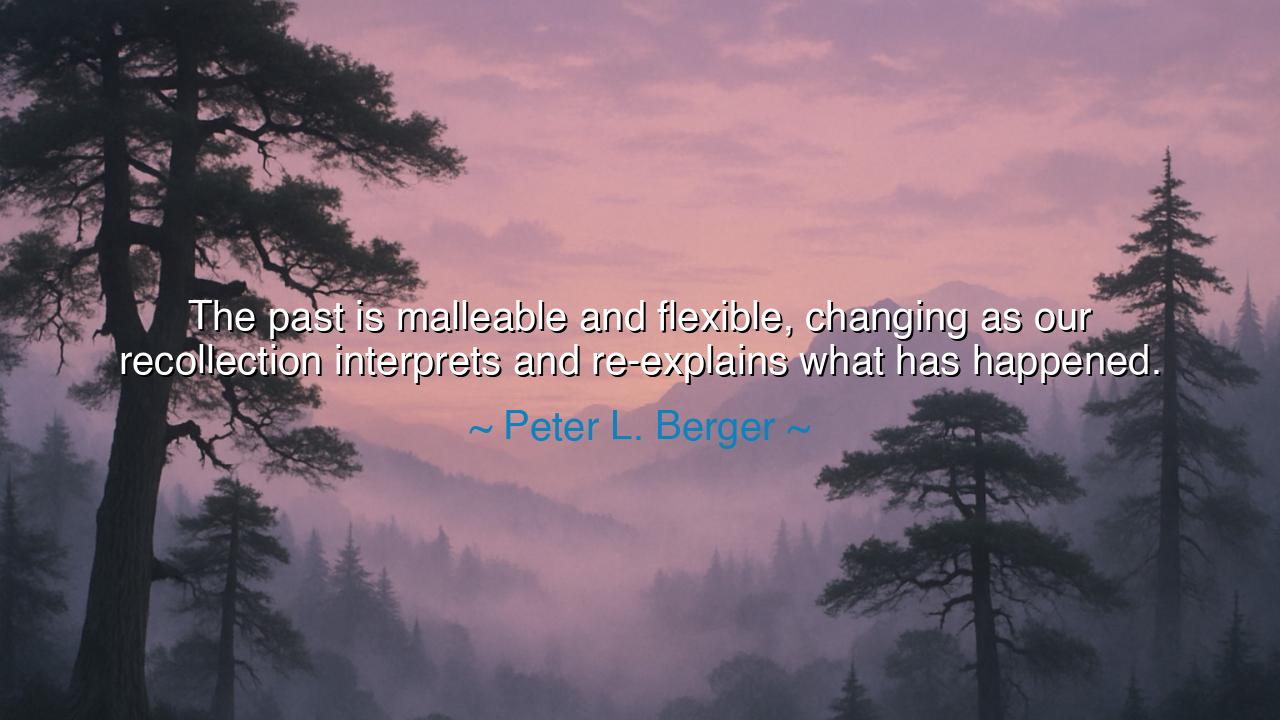
The past is malleable and flexible, changing as our recollection
The past is malleable and flexible, changing as our recollection interprets and re-explains what has happened.






“The past is malleable and flexible, changing as our recollection interprets and re-explains what has happened.” Thus spoke Peter L. Berger, the philosopher and sociologist of the modern age, whose sharp mind gazed into the deep workings of memory, society, and belief. In these words lies a profound revelation — that history is not a fixed monument, carved in stone for all time, but a living tapestry woven anew with every generation. The past, he tells us, is not merely what was, but what is remembered — and remembrance, being human, is fragile, fluid, and ever-changing.
The origin of this insight comes from Berger’s lifelong exploration of how humans construct their realities. In works such as The Social Construction of Reality, he argued that societies do not merely reflect truth, but create it through shared meanings, stories, and memories. Thus, the past is not an eternal scroll but a mirror — and each age, each person, polishes it differently. When Berger wrote that “the past is malleable,” he did not mean that the facts themselves cease to exist, but that our perception of those facts bends and shifts as we seek meaning in them. Memory, after all, is not a perfect recording; it is a story we tell ourselves to make sense of who we are.
This truth can be seen in all of human history. Consider the fall of Troy, that ancient city immortalized in Homer’s epics. Was it truly a war of gods and heroes, or a brutal struggle for trade and power? The poets remembered valor; the archaeologists later uncovered rubble. The story of Troy became not one event, but many — molded by poets, priests, and scholars, each seeking their own truth. So it is with all nations and peoples: the past is not dead, but reinterpreted by those who inherit it. As generations pass, memory becomes myth, and myth becomes meaning. The past, therefore, is less a chain that binds us, and more a clay that each age reshapes in its own image.
Berger’s words also reveal the intimate struggle of the human heart. Each of us carries our own private history — a collection of joys, regrets, and choices — yet we do not remember it as it truly was. We soften some edges, sharpen others, and reinterpret what we once lived so that we may bear it. What we call “forgiveness,” “healing,” or even “nostalgia” is often the act of reshaping the past to restore peace within the soul. Thus, memory is not just a record; it is a tool of survival. We bend it, sometimes unconsciously, so that we can continue forward without being crushed by the weight of what has been.
But beware, for the malleability of the past is both a blessing and a danger. When used wisely, it allows humanity to grow, to learn, and to reconcile. Yet when abused, it becomes a weapon — for there are those who would rewrite history not to heal, but to control. Tyrants and ideologues have long known this truth: that by reshaping how people remember, one reshapes how they think, how they act, and how they dream. The erasure or distortion of memory — the rewriting of what truly happened — is the slow death of truth. And when truth dies, so too does freedom.
A clear example shines from the twentieth century, when nations grappled with the memory of World War II. In Germany, the wounds of history were confronted with painful honesty, so that a people might never again be deceived by tyranny. But in other places, the past was softened, reinterpreted, even denied, to escape guilt or preserve pride. Thus, one sees that how a people remember determines how they live. The past, though unchangeable in fact, is endlessly reshaped in meaning, and that meaning directs the course of the future.
So, my children, take this wisdom as both shield and mirror. Know that memory is power, and that how you tell your story shapes not only how others see you, but how you see yourself. Be honest in remembrance — not cruelly, but courageously. Learn from your history, but do not be its prisoner. Shape your past with truth, not vanity, for only truth gives strength. When you look backward, do so not to dwell in regret, but to discern the path that leads forward with wisdom.
And thus, the teaching of Peter L. Berger stands eternal: the past lives only through our interpretation, and in understanding this, we hold the key to both history and destiny. The wise do not seek to erase what was, but to see it clearly — to hold it in their hands like clay, molding it not into illusion, but into insight. For those who master their memory master themselves, and those who master themselves may yet master the future.






AAdministratorAdministrator
Welcome, honored guests. Please leave a comment, we will respond soon